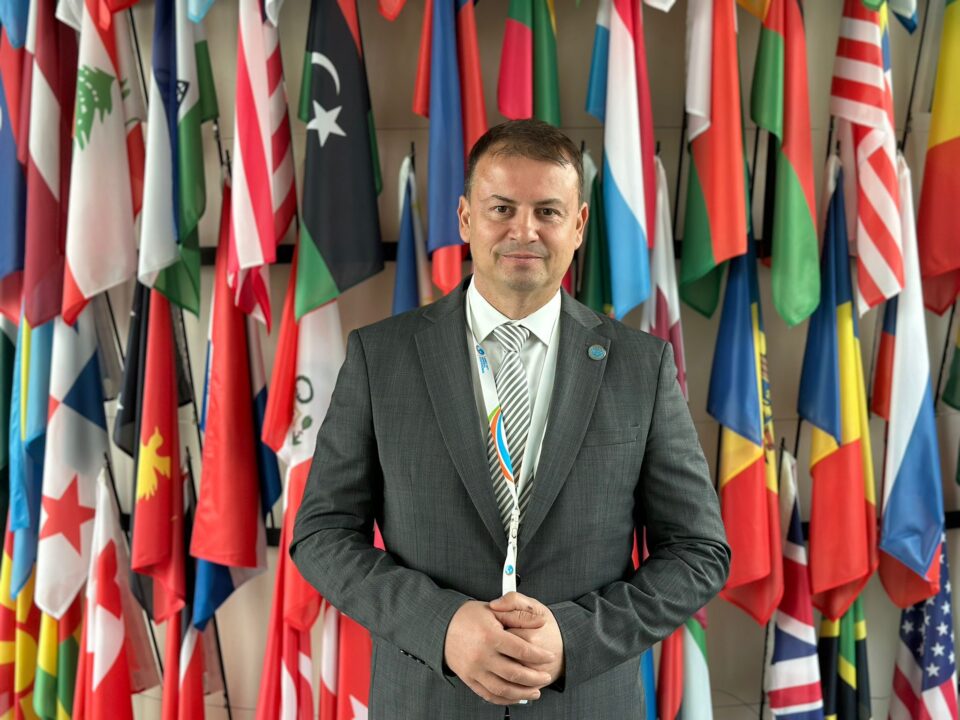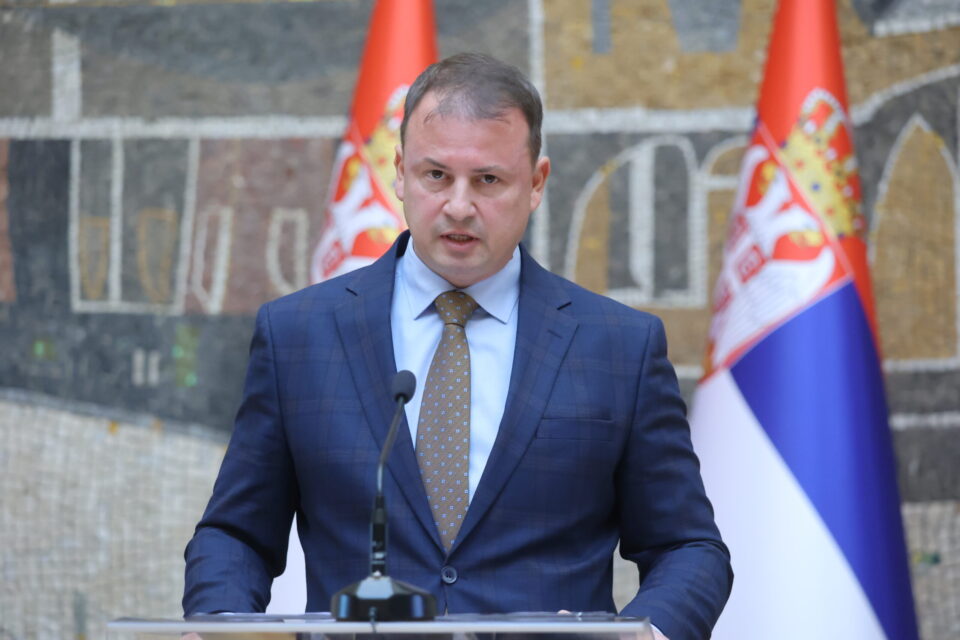We want to transform the industry in the direction of innovative and technology-intensive sectors, while adhering to the principles of sustainable development

On the sidelines of the World in 2024 conference, organized by Color Media Communications, just as we are about to enter a new year, we spoke with one of the conference participants, Slobodan Cvetković, the Minister of Economy, about the new industrial policy strategy that will be implemented as of 2024. The minister spoke about the challenges facing the Serbian economy, how globalization affects our country and what is the industry of the future.
You recently returned from the Fair Globalization – Innovative Solutions for the Industry of Tomorrow conference. Can globalization be fair and how can we prevent the the gap between the rich and the poor from becoming even wider?
I participated in the 20th General Conference of the United Nations Industrial Development Organization (UNIDO) whose goal was to create new paths towards sustainability, digital inclusiveness and economic resilience through discussions and panels. The discussions clearly showed what is needed at the global level, namely investments in infrastructure, sustainable energy systems, food supply security, green technologies, digitization, artificial intelligence, education and empowerment of women.We live in an interdependent world, everything is interconnected. We share one planet and are responsible for global development that ultimately affects us all. Therefore, it was discussed how future industrial policies should look to ensure a fairer globalization and what measures countries can implement to take advantage of the opportunities provided by the energy transition, digitalization and demographic changes. Actions that the international community can take to accelerate sustainable industrialization in the least developed countries were also suggested. We need long-term investments in sustainable industrial development and above all genuine global partnership and solidarity to give hundreds of millions of young people around the world a good perspective for the future. Sustainable economic development requires constant reforms, investments in human capital and a focus on innovation and entrepreneurship. If we focus on sustainable industrialization, innovation and inclusive economic growth, we will take a significant step towards creating shared global prosperity.
Industrial policy strategy
As a response to the challenges in the modern economy, at the proposal of the Ministry of Economy, the Serbian Government adopted the Industrial Policy Strategy covering the period from 2021 to 2030. For the year 2024, we plan to adopt a new Action Plan for the Strategy for the 2024-2025 period. The general goal of this strategy is to boost the competitiveness of the Serbian industry by accomplishing five specific goals, with a set of measures and activities dedicated to digitalization, innovation, investments and restructuring.
In 2024, the implementation of the financial support programme for companies will continue, with a budget of RSD 2 billion
What is the industry of tomorrow and can Serbia keep up with the world in this regard?
The industry of tomorrow is innovation-based. Innovations are a key driver of industrial development and economic growth. Secondly, to increase the economy’s resilience and continue along the path to sustainable development, higher investments and their quality are of crucial importance. Accordingly, one of the special goals of the Industrial Policy Strategy is to increase the volume of quality, high- and medium-technology investments, in order to increase the added value of industrial products. We want to transform the industry in the direction of innovative and technology-intensive sectors while adhering to the principles of sustainable development. Digitization is the next special goal outlined by the strategy, not only as a transformation of the economy but also of society as a whole. At the time of the 4th industrial revolution, digitization was a prerequisite for company survival, both in the domestic and global markets. That is why we are focused on education in this area. Innovative solutions are a prerequisite for the transformation of the industry from a linear to a circular model, which is another specific goal of our strategy. The circular economy, as a model of sustainable development, must be very carefully coordinated, as it involves a wide range of relevant participants and is connected to all areas of industry. Investments in green projects will have a positive effect on competitiveness and economic growth in the long term, through creation of new jobs and increased exports in medium and high technologies. These are very important activities for us and we expect support through the network of projects as these are also global goals.
What is the state of our economy after the pandemic-induced crisis? Have we recovered and how do we look today from the point of view of sustainability, especially in times of crisis?
The coronavirus pandemic, but also the energy crisis and the recent global political turbulence have had a strong impact on the global economy, but I can say that the Serbian economy is accelerating and that, if it continues at this pace of development, despite the significant slowdown of the European economy, it can achieve the planned GDP growth in 2023. For instance, our economy recorded a growth of 1.7 percent in the second quarter of 2023, while in the same period, the growth of the European Union’s economy stood at close to 0.5 percent. This favourable trend from the second quarter continued in the second part of the year, where the growth was 2.5 percent. Construction and the information and communication technology (ICT) sectors are on the rise in the second quarter. The construction sector achieved a growth of as much as 15.1 percent, while the ICT sector recorded a 10.1 per cent growth.

How much do we rely on our own resources and entrepreneurship?
The Ministry of Economy provides great support for the development of small and medium-sized enterprises in Serbia. The goal is for domestic small and medium-sized companies in the future to adopt the standards, production processes, quality of work and procedures that exist in global companies because this is the way to become a part of large value chains. Serbia is recognized as a healthy terrain for investments, a market economy and a country ready to participate competitively in European and the global market, but we have to be quick in adopting market standards and the best way to do this is to operate in global value chains and implement their rules of the game. This year, we allocated RSD 3.4 billion in grants to support the sector of small and medium-sized enterprises. We implement four support programmes for the purchase of equipment, development projects, support for business beginners, young people and women entrepreneurs, as well as for everything that is required to maintain production processes up to certain standards and intentions in the service of our economy’s development. Also, the 2023-2027 Strategy for the Development of Small and Medium-Sized Enterprises was adopted, along with the 2023-2024 Action Plan. In 2024, the implementation of the financial support programme for companies will continue, with a budget of RSD 2 billion. Then, together with the Development Fund, we will continue to implement the financial agreement with the EIB, which puts another 90 million euros at the Republic of Serbia’s disposal for facilitating investments by companies, as well as activities on contracting an additional 10 million euros of European Union funds that will be available to companies in the next period.
This year, we allocated RSD 3.4 billion worth of grants to support the SME sector
Is the policy of subfinancing foreign investors justified? One gets the impression that they are here to take from us, not to create something for us. Why is there such an impression at all?
The Republic of Serbia has enormous benefits from foreign investments. It is enough to mention only one such as investments in production facilities and new fixed assets in the amount of more than several tens and even several hundred million euros, the application of the latest production technologies, a significant increase in the export of finished products to foreign markets by foreign companies, the employment of production workers and the employment of highly educated staff, etc. Due to the constant improvement of the economic environment here, as well as the fact that we have harmonized the state aid system with the rules of the European Commission, foreign investors are showing increased interest in Serbia as an investment location. The Ministry of Economy will continue to support domestic companies and the growth trend of strategic foreign direct investments (FDI). The FDI influx in Serbia was higher than the total FDI influx in other Western Balkan countries. Overall, from 2012 to September of this year, Serbia attracted more than 32 billion euros of foreign direct investments, both those that were not supported by incentives and those that were. We profiled ourselves as a leader not only in the region but also among the leading countries in Europe and the world in terms of the number of foreign direct investments in relation to the size of our economy. Accordingly, I believe that the policy of co-financing investment projects implemented by both domestic and foreign investors is absolutely justified. There is specific data that speaks in favour of this. Currently, the Ministry of Economy’s portfolio contains over 300 projects, some of which are active and are in the process of implementation and some of which are under monitoring. With the projects that we have successfully completed this and last year, we are talking about more than RSD 720 billion dinars worth of investments, which created over 100,000 jobs in our country. These are, in my opinion, impressive data.
What help does the Government offer to domestic entrepreneurs and small and medium-sized enterprises, which, as it turned out, proved to be the most resilient but also the most vulnerable sectors during the crisis?
I would like to cite an example of the assistance that was provided to companies this year because we will continue working in this direction even more next year. In 2023, the Ministry of Economy allocated RSD 22.655 billion to support domestic and foreign companies with the investments they make. We helped more than 110 companies in 2023 and by the end of the year, we will have spent all of the allocated budget funds. In 2024, RSD 23 billion dinars have been allocated to support companies with their investment projects. Furthermore, thanks to other state aid instruments we are helping and will help projects that are implemented in Serbia. In addition to this aspect, i.e. concrete support for the economy, I would also like to highlight the institutional aspect whereby companies will receive assistance and facilitate cooperation with other state bodies, such as the Development Fund, RAS, AOFI and local economic development offices. This year, we allocated RSD 3.4 billion worth of grants to support the SME sector.
From 2012 to September 2023, Serbia attracted more than 32 billion euros of foreign direct investments
Is the domestic economy ready for the transition to the circular economy and sustainable and socially responsible business?
Under the auspices of the Action Plan for the Implementation of the Industrial Policy Strategy in the period 2021-2023, the Ministry of Economy has defined measures and activities to lay the foundation for the transition to the circular economy. First, through promotional activities, we need to raise awareness of the importance of the circular economy and then educate companies to apply such solutions in practice as efficiently as possible. The circular economy development support programme was adopted by the Government in September 2021 and is implemented by the Ministry of Economy in cooperation with the Chamber of Commerce and Industry of Serbia. The Chamber of Commerce and Industry of Serbia conducted a study titled „The state of the circular economy in Serbia 2021/2022“ based on which a plan was devised for the implementation of promotional and educational activities related to the circular economy. We jointly organized numerous training sessions and defined guidelines and instructions, especially in the areas such as waste management, waste water regulation, decarbonization and carbon footprint. The Ministry of Economy supported the procurement of equipment for energy efficiency and for the improvement of ecological aspects of production, as well as invited companies to utilize incentives for the acquisition of equipment that enables a circular business model and energy-efficient production equipment.
